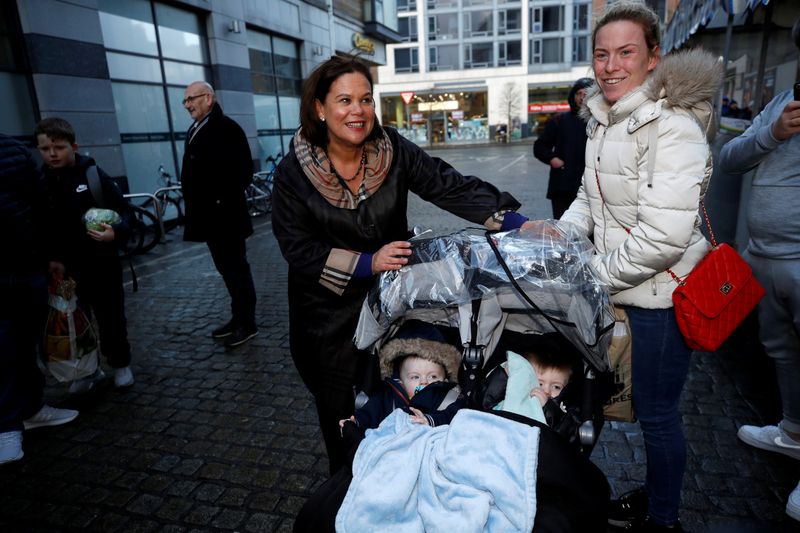
Sinn Fein leader Mary Lou McDonald meets with members of the public in Dublin, Ireland, February 10, 2020. REUTERS/Phil Noble
February 10, 2020
By Conor Humphries and Graham Fahy
DUBLIN (Reuters) – Sinn Fein on Monday demanded inclusion in Ireland’s next government after a record election showing, a move that would raise its central goal of reunification with Northern Ireland toward the top of the agenda in Dublin for the first time.
The left-wing Irish nationalist party stunned the establishment by beating the two center-right parties that have led every government in the country’s history, almost doubling its vote share from the last election to 24%.
Sinn Fein’s low number of candidates means, however, that it is likely to secure at best the second largest number of seats when two days of counting nears conclusion later on Monday – just behind the center-right Fianna Fail and around the same level as Prime Minister Leo Varadkar’s Fine Gael.
Successive surveys suggested the Sinn Fein surge was based almost exclusively on the major campaign issues of healthcare and the high cost and low availability of housing, with the idea of Irish unity barely registering with voters.
However the former political wing of the Irish Republican Army said ahead of the vote that a condition for any coalition would be immediate preparations for a referendum on unity with Northern Ireland, a British province, that it would push London to hold within five years.
“We have had a historic election. There is no doubt that the old politics of the two-party system is now gone and over, a thing of the past,” Sinn Fein leader Mary Lou McDonald told national broadcaster RTE. “This vote for Sinn Fein is a vote for Sinn Fein to be in government.”
Both Fine Gael and Fianna Fail have insisted for years that they would not govern with Sinn Fein, citing differing economic policies and its past links to the IRA. The militant group fought against British rule in Northern Ireland in a conflict in which some 3,600 people were killed before a 1998 peace deal.
Fine Gael repeated its insistence on Monday while Fianna Fail said it saw significant hurdles to such a tie-up.
“We certainly will engage with them. We’re not going to refuse to talk,” Fianna Fail deputy leader Dara Calleary told RTE. “But let’s be in no doubt that those policy difficulties and those principles are still difficult hurdles.”
BORDER POLL?
Under the 1998 Good Friday deal that mostly ended decades of violence between Catholic nationalists seeking to merge Northern Ireland with Ireland and Protestant unionists who want it to remain part of the United Kingdom, Britain’s minister for the region can call a referendum if a “yes” majority looks likely.
A vote would also be required in Ireland and an exit poll on Sunday showed that 57% of voters backed holding one within five years. Eighty-one percent of Sinn Fein supporters want a poll, compared to 52% of Fianna Fail voters and 44% among Fine Gael.
In its election manifesto, Sinn Fein said it wanted to establish a parliamentary committee and citizens assembly to plan for Irish unity.
McDonald, whose party members sang Irish rebel songs and flew the Irish tricolor flag as candidate after candidate were elected on Sunday, believes Britain would only consider calling a poll when Ireland is pro-actively planning for unification.
Fianna Fail and Fine Gael also want to see the unification of the island – partitioned almost a century ago – but say now is not the time. Fianna Fail pledged in its manifesto to start some preparations, but nowhere near the level Sinn Fein wants.
The issue would probably be a critical point of negotiation and possible stumbling block in any government negotiation. Fine Gael and Fianna Fail could also continue to freeze Sinn Fein out with a coalition or minority government deal of their own.
A senior member of the Democratic Unionist Party (DUP), which shares power with Sinn Fein in Northern Ireland, said he was not worried about Sinn Fein’s surge in Ireland.
Gregory Campbell told BBC that Irish voters were not moving to Sinn Fein over the cause of Irish unity.
(Additional reporting by Amanda Ferguson in Belfast; Writing by Padraic Halpin; Editing by Mark Heinrich)

